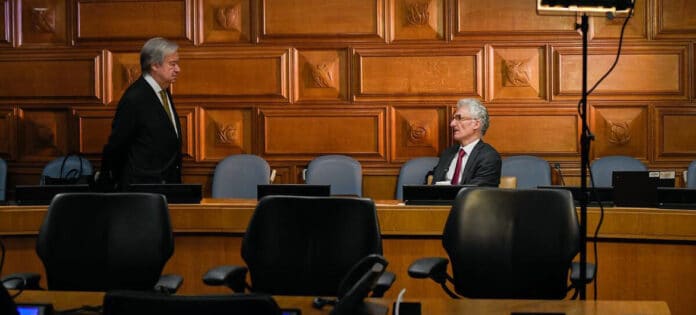
The international response to Monday’s High-Level Pledging Event on Yemen has been described as “disappointing” by the UN chief, announcing that pledges totalled less than last year’s humanitarian response, and a billion dollars less than the figure raised in 2019.
Despite that, millions of Yemenis desperately need more aid to survive, with some $1.7 billion pledged by the end of the morning – falling short of the appeal when the conference began, for $3.85 billion.
“Cutting aid is a death sentence”, UN Secretary-General António Guterres said after the event concluded. “The best that can be said about today is that it represents a down payment”.

The Swedish Minister for International Development Cooperation, Per Olsson Fridh, told media in Sweden that he is worried about the situation in Yemen but believes the conference can put pressure on the parties to proceed with the peace efforts.
“In the end, the only path to peace is through an immediate, nationwide ceasefire and a set of confidence-building measures, followed by an inclusive, Yemeni-led political process under United Nations auspices, and supported by the international community. There is no other solution”, Mr. Guterres spelled out.
“The United Nations will continue to stand in solidarity with the starving people of Yemen”.
Famine ‘bearing down’
Speaking earlier at the conference to help lift the spectre of starvation looming over 16 million people, the UN chief warned, “famine is bearing down on Yemen”, adding that it’s “impossible to overstate the severity of the suffering”.
He painted a grim picture of more than 20 million Yemenis in desperate need of assistance and protection – especially women and children.
Around two-thirds are suffering food shortages, healthcare or other lifesaving support, while some four million have been forced from their homes, with hundreds of thousands of others under threat.
Around 50,000 are already starving in famine-like conditions, with some 16 million at risk of hunger this year – with the most acute cases in conflict-affected areas.
“The risk of large-scale famine has never been more acute”, spelled out the UN chief. “The race is on, if we want to prevent hunger and starvation from taking millions of lives”.
‘Unbearable’ conditions
The Secretary-General said that last year, the conflict killed or injured more than 2,000 civilians, devastated the economy and crushed public services.
And noting that barely half of Yemen’s health facilities are fully functional, he pointed to the COVID-19 pandemic as “one more deadly threat in a country facing such severe health challenges”.
“For most people, life in Yemen is now unbearable”.
‘Special kind of hell’
Against the backdrop that children are starving and nearly half of those under age five are facing acute malnutrition – suffering wasting, depression and exhaustion – Mr. Guterres called childhood in Yemen “a special kind of hell”.
He warned that 400,000 children face severe acute malnutrition and could die without urgent treatment and noted starving children are even more vulnerable to preventable diseases like cholera, diphtheria and measles.
Sick and injured children are turned away by overwhelmed health facilities that lack the drugs or equipment to treat them.
“Every ten minutes, a child dies a needless death from diseases”, he lamented. “And every day, Yemeni children are killed or maimed in the conflict”.
And long after the guns fall silent, they will continue to pay a high price with many never fulfilling their physical and mental potential.
“This war is swallowing up a whole generation of Yemenis”, he said. “It has to stop”.






